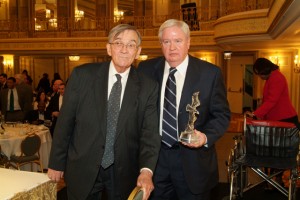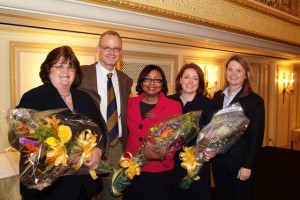
Justice James Fitzgerald Smith (right), chairman of The John Marshall Law School Alumni Association’s annual Freedom Award and Distinguished Service Awards Luncheon, prepares to present Illinois Appellate Court Justice Joseph Gordon (left) with the association’s Freedom Award at the May 13, 2011, event.
An appreciative Justice Joseph Gordon of the Illinois Appellate Court accepted the 2011 Freedom Award from The John Marshall Law School Alumni Association saying he was accepting it “generically for the privilege of having had the opportunity to commit my professional life to the legal profession in three segments: as a lawyer in law practice; as a law professor; and as a member of the judiciary.”
Gordon accepted the award May 13, 2011, at the association’s annual Freedom Award and Distinguished Service Awards Luncheon. He spoke to a gathering of nearly 450 guests at the event.
“It is only fitting for the alumni of this great law school in the establishment of their annual Freedom Award to recognize the contributions of our profession and to celebrate its achievement in the protection and preservation of our liberties, and most important of all, to confront the challenges that we must face to ensure our continued availability to everyone—rich, poor, or middle class—so that our liberties do not fade or falter.
“And in that respect, I am overwhelmed to be [the 2011] designee as the recipient of this award,” the justice added.
Gordon said his chosen profession has given him “a unique opportunity to help protect and participate in the maintenance of the basic freedoms guaranteed us by our Constitution and Bill of Rights,” but it takes a fair and just legal system to make certain that all peoples receive the guarantees of these freedoms, he told the audience.
The justice cites “Two Concepts of Liberty” an essay by Isaiah Berlin, as the outline for how Americans reflect on their governance under the law.
There are those who say the right to be free of external restraint—to be able to function and make one’s choices without external interference or obstruction—is the true test of liberty. Berlin termed it negative liberty, because these are rights that cannot be bartered or traded away. These include belief systems and freedoms of self-expression.
By contrast, Berlin’s theory of positive liberty focuses on one’s desire to be free from an internal struggle for one’s own internal liberty from passions and weaknesses by allowing the state or community to impose moralistic and political limitations on actions.
While we are willing to accept these interventions, “It is here that vigilance must be exercised to prevent the state, even in an otherwise relatively free society, from usurping too much of our personal sovereignty, which can lead to the oppression of the minority by the collective will of the majority.
“Whichever concept of freedom one adheres to, its implementation remains unattainable without the protection of a fair and egalitarian system of justice,” Gordon said.

Kim Anderson (right), president of The John Marshall Law School Alumni Association, gave special recognition to John Marshall employees whose work was invaluable in putting together the Freedom Award luncheon and other alumni events during the 2010-2011 academic year. Receiving honors were (from left) Elinor Kannon, director of the Department of Event Management; Bruce Swart, graphics designer in Institutional Affairs; Vanessa Jackson, administrator in the Office of Alumni Relations; and Sherri Berendt, director of the Office of Alumni Relations.
To protect these rights and liberties, our justice system must provide the litigants with an even playing field necessitating full access to competent legal representation. Gordon is concerned that the rising cost of legal services deprives the middle class, as well as the poor, from such access.
“Without lawyers of comparable competence the court cannot offer an even playing field, and the justice obtained through our judicial system is at risk of being illusory. If the poor and the middle class are unable to procure lawyers of commensurate skill and experience, the protection of the liberties of those who are most in need of it is placed in jeopardy,” he said.
Gordon believes good is coming from the contingent fees that cover the cost of tort litigation and class action suits that allow many to be represented as one. He applauds our law schools for their curriculum enhancement to include training in the skills involved in alternate dispute resolution and for their encouragement and support of legal clinics to help provide legal representation to those who otherwise would be unable to afford the legal fees and costs of the private practitioner.
“This work must be applauded and stressed so that students, once they graduate, contribute their own pro bono services to the public and support the work of law school clinics and nonprofit organizations that are trying to meet the legal requirements of the neediest,” the justice stressed.
